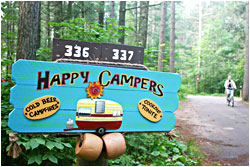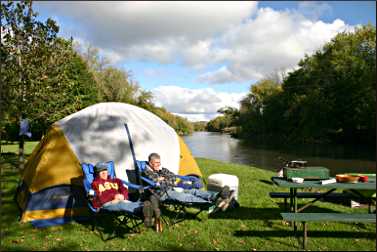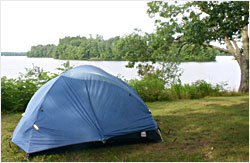What to bring on a camping trip
Here's how to keep your packing list short but still have what you need.

© Beth Gauper
Tent camping is the best deal in travel. You can go at the last minute, you get the most scenic locations and you pay a pittance.
It's too bad about all that stuff you have to bring along.
Some super-organized people love to pack gear and have most of it ready to go after the last camping trip. But most of us aren't that kind of person.
Most of us just want to head out the door and go. But if you want to save on a hotel bill, you've got to bring stuff.
The question is, how much? Here's how to make it easy on yourself.
The easiest way, especially if you have kids, is to join one of Minnesota's I Can Camp! programs for beginning campers, because all the gear is provided.
Even if you have a roof, the packing list can get complicated. For more, see What to bring to a rented cabin.
What you need to run out the door: the basics
Technically, all you need is a tent, a sleeping bag, a sleeping pad and a pillow.
If you don't have a sleeping bag or pad, make a sleep sack from an old flannel sheet and bring a yoga mat. And you can always make a pillow by stuffing your clothes into an old pillowcase.
If you like to keep clean, bring a toiletry bag, including soap, and a towel.
If you're a light sleeper, bring ear plugs.
That's it.
But don't you need a cooler? No, because the easiest way to keep things simple while camping is to not cook.
I like staying in municipal campgrounds, such as the ones in Lanesboro, because then I can stroll over to a deli, bakery or even a farmers market.
I do, however, bring a little electric hotpot. In the morning, I plug it into a bathhouse outlet and make myself coffee, which I enjoy with fruit and muffins that I bring.

© Beth Gauper
Some campgrounds have on-site or adjoining restaurants, such as Saxon Harbor County Park on Lake Superior in northern Wisconsin. It's among our 30 great campsites, along with Lanesboro's two city campgrounds.
For 15 state-park campgrounds that are near a whole portfolio of amenities, including restaurants, see Camping without roughing it.
A few extras that will make you happy
Everyone's different, but at the end of the day, I like to sit in a lightweight folding camp chair and have a cold beer out of a small cooler.
And that coffee I make? It's rich, cold-brewed concentrate, perfect for travel. No grounds; just add hot water. You can buy a Filtron or Toddy kit and make it yourself, or buy some already made at Trader Joe's.
Before sleeping, I like to read a book with my headlamp, which also comes in handy for middle-of-the-night potty runs. If you're camping later in the season, when nightfall comes early, it's fun to watch a movie on a laptop.
If it rains, you'll be happy to have a game — a deck of cards or Bananagrams don't take up much room.
Most people like a campfire. In that case, don't forget kindling and a fire starter. Buy your wood on-site, so you don't transport any nasty bugs.
A few extras that will make you comfortable
You'll need bug repellent — unless you camp in southeast Minnesota, which is so well-drained it has very few mosquitoes. For more, see Getting away from mosquitoes.
To cut down on the clothes you need, leave your cotton at home and bring only quick-dry synthetics. If you dribble ice cream on your shirt, just rinse it off and put it back on.
A quick-dry microfiber towel is invaluable, too. You can use it to dry yourself, your tent, your picnic table, etc.
Pack sunscreen and a hat, to avoid burns and wrinkles.
Park bathhouses are not always spick and span, so bring flip-flops for the shower. Water shoes are great for climbing around waterfalls and on rocky beaches.
A few extras that are handy to have

© Beth Gauper
Visit any outdoors or sporting goods store, and you'll find all kinds of handy camping doodads. It's easy to go overboard, so remember, you're trying not to have too much stuff.
I do like a collapsing cup for my toiletry bag, so I can brush my teeth. And if you're camping in a place that doesn't have showers, you can wash your hair with the help of a collapsing water bucket.
If you wear contacts, it's easier to put them in with the help of a small mirror.
For washing hands and dishes, you'll want a water container with a spout that you can rest on your picnic table. If you don't plan to drink from it, just use an old laundry detergent container.
Even if you don't cook at your campsite, you'll probably be cutting fruit or making sandwiches for picnics. In that case, you'll want a cutting board and a decent knife with a sheath.
If it hasn't rained lately, the ground may be hard, and you might need a hammer to pound in your tent spikes.
If it's going to rain, a tarp comes in handy to protect your wood, your bikes, your picnic table and so on.
It never hurts to have a first-aid kit, though most people don't need anything more than a Band-Aid or two. If you'll be in a remote place and are worried about safety, see Don't be a dope in the woods.
Some handy tricks
Instead of ice, I use frozen juice boxes in my small cooler. A few of those are enough to keep my beer cold, and in the morning I have cold juice.
You can also use frozen brats, which are easy to cook on a stick over a campfire.
If you do want to get into cooking, see Trail Cooking 101.
Buzzfeed offers 41 Camping Hacks That Are Borderline Genius — and they are, too. Sample: Strap a headlamp to a gallon jug of water to make a tent lantern.
Lifehack offers 30 Brilliant Camping Hacks I Wish I Knew Earlier. Sample: Use corn chips as kindling and deodorant to combat itchiness.
If you decide to bring more stuff, check out garage sales and thrift shops before you spend a lot of money in sporting-goods stores. Most people have way too much stuff, and they're happy to pass it on to you for pennies.
For more on finding a good place to camp, see How to find the best campsites.